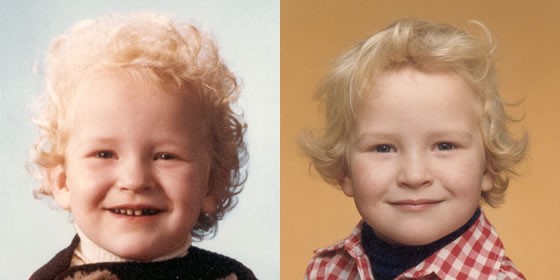
B-b-back Then
See the boys in the picture? The one to the left had just learned to speak longer sentences. Some months later, he’d be sitting on the floor, reading stories to his kindergarten friends. The boy to the right, one year older, with his smile more like a rigid grin, could hardly speak at all. You see, he had ‘picked up a stutter,’ and what one picks up, they said, you cannot lose.
Not that they used the word ‘stutter’. Maybe it was an evil word? Verboten even to utter? Well then, maybe it would just disappear if no one talked about it.
But it didn’t. It got worse every day, and each sentence drove the nails deeper. The boy was admitted to school which, day by day, turned into hell, filled with laughter, insults, beatings. Whenever teachers asked him to comment, he b-b-babbled away happily until his classmates’ stares stopped the flow, like caltrops thrown at his larynx, the spasms branching out until they reached his toes, paralyzing his body, brain and heart.
Maybe if you don’t mention it, it will disappear. Just don’t talk about it.
His younger self still lived inside him ‒ the memory of himself prior to that fateful picking-up event. But he couldn’t connect with him. Between his former self and present self was a landfill of fear.
Two decades later, that unspeakable something he had picked up at the age of three still hadn’t gone. Much of his life had turned into an unbearable chore. During the years, he had sorted his massive vocabulary according to the difficulty of the word. While he was talking, he could see the sentences build up in his mind’s eye, hard words blinking, leaving him just enough milliseconds to substitute easier, non-blinking words.
Language failed him, and he was close to failing life, until that one day when everything changed. You see, every good story has a moment when magical fairy dust rains from the sky, and in Matt’s case it came when a combination of people said just the right words at just the right time.1 From this day on, symptoms started to vanish, and a month later, they were gone.
— Just as he had picked up the stutter, he lost it. Poof.

As I’m writing this, my son is about a week away from his first day of school. When he was younger, he experienced what most kids do during their early years - a developmental stutter. When I first heard him being non-fluent for a second, my heart stopped and decades of memories rushed through my brain. As most other kids do, he lost that developmental stutter after a couple of weeks. Seldom had I been so thankful. Roller-coaster rides can be fun, if you’re the one who chooses which ticket to buy.
I’m unbelievably grateful that I could learn to speak twicein my life. I got my Master’s in linguistics and compsci in record time; I truly understand many intricacies of language; but most of all, I learned to love language. Being an ex-stutterer still has a profound impact on my professional life as an IT project manager, personal coach, psychotherapist, and - currently - Content Shrink.
It is possible to lose a stutter, and almost any other disabling pyschological pain, but the path to your solution always is your path. Look for guideposts along the way. Ignore the haters. Ask for help, because if you talk about it, it will disappear.
-
Addendum: Some readers have asked me: ‘Who said what? How exactly did that Poof happen?’ I deliberately didn’t write about my healing process in more detail, simply because what worked for me will, with near certainty, not work for you. Both from a personal and professional point of view, I highly doubt that others can truly benefit from learning about how one person tackled her or his individual disease. The story as a whole, of course, can be inspirational. However, I ask you to realize that everybody’s story is different, and calls for different responses. The best advice I can give to those affected and their friends or family alike is this: go out and find what works for you. It’s my sincerest hope that stories like the one above can make a tiny dent in someone’s life and inspire them to keep going. Once this inspiration starts to take root in yourself, you’ll be better able to reach out, experiment, see what works for you, and find your own poof. ↩︎